Can you guess what movie or TV show we’re watching? We’ve turned on subtitles (when available) not to give you a clue, but to enhance that WTF effect! Leave your best guess in the comments to prove your true Flick Attackosity!
Terminal Invasion (2002)
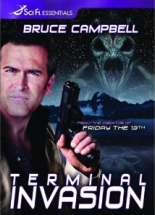
 During a blizzard, a group of people is trapped inside a tiny airport. As a felon named Jack (Evil Dead icon Bruce Campbell) learns following a trip to the men’s room, some of the airport’s inhabitants are really aliens disguised as humans. Thus, the group has to simultaneously trust each other and figure out who among them isn’t the real deal. If it sounds like John Carpenter’s The Thing meets the TV sitcom Wings, you’re right!
During a blizzard, a group of people is trapped inside a tiny airport. As a felon named Jack (Evil Dead icon Bruce Campbell) learns following a trip to the men’s room, some of the airport’s inhabitants are really aliens disguised as humans. Thus, the group has to simultaneously trust each other and figure out who among them isn’t the real deal. If it sounds like John Carpenter’s The Thing meets the TV sitcom Wings, you’re right!
All the stock characters are present in Terminal Invasion: the kindly old woman, precocious kids, harried businessman, insensitive husband, nagging wife, scaredy-cat security guard — right down to the token black guy who says things like, “This is whack!” and “Yeah, now that’s what I’m talkin’ ‘bout!”
 Campbell is the bad guy who is forced by circumstances to become the good guy, and Star Trek: Deep Space Nine starlet Chase Masterson is a feisty alpha-female pilot. They try to find out who’s got the alien inside them by taking turns going through the X-ray machine, and not one of them brings up the sterility issue. Kids, don’t try this at home!
Campbell is the bad guy who is forced by circumstances to become the good guy, and Star Trek: Deep Space Nine starlet Chase Masterson is a feisty alpha-female pilot. They try to find out who’s got the alien inside them by taking turns going through the X-ray machine, and not one of them brings up the sterility issue. Kids, don’t try this at home!
The first half of this straight-to-cable movie is actually pretty decent. It’s not until it becomes the standard cat-and-mouse game that things get … well, standard. Friday the 13th‘s Sean S. Cunningham directs better than usual, while Campbell is, as always, terrific fun to watch, even when mired in dung. —Rod Lott
Toga Party (1977)
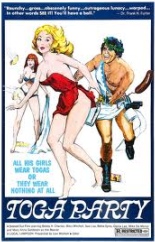
 The deservedly obscure broad ’n’ bawdy comedy Toga Party begins not at a toga party, but on a farm, where Purvis, an easygoing guy with a ‘fro, spends his days strumming the guitar, boning Betty Jo in the barn and dreaming of becoming a singer. One day, he up and decides to go to New York in search of stardom, so he does.
The deservedly obscure broad ’n’ bawdy comedy Toga Party begins not at a toga party, but on a farm, where Purvis, an easygoing guy with a ‘fro, spends his days strumming the guitar, boning Betty Jo in the barn and dreaming of becoming a singer. One day, he up and decides to go to New York in search of stardom, so he does.
Upon arrival, he roams the streets, not in search of a toga party, but a club that’ll let him play. No one will. On a chance meeting, he is discovered by a sleazy, two-bit agent named Suzy Starmonger. She books him not at a toga party, but at an obnoxious bar where a pie fight is liable to break out at the drop of someone’s pants.
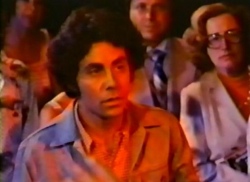 Now redubbed “Pelvis” because of his vocal likening to the King and because of his large penis, Purvis becomes a minor star singing hits like “Nazi Girl,” “I Know a Man Who Screwed a Chicken,” “Suck My Way to the Top” and “Maria, My Little Wetback.” He also gets mixed up in hard drugs and loose woman, but nary a toga party.
Now redubbed “Pelvis” because of his vocal likening to the King and because of his large penis, Purvis becomes a minor star singing hits like “Nazi Girl,” “I Know a Man Who Screwed a Chicken,” “Suck My Way to the Top” and “Maria, My Little Wetback.” He also gets mixed up in hard drugs and loose woman, but nary a toga party.
Other than a spoof of the infamous crying-Native American litter PSA, there’s nothing really funny about Toga Party, but it’s fairly painless. In case you hadn’t figured it out by now, at no time does anyone go to (or even talk about) a toga party. —Rod Lott
Action Jackson (1988)
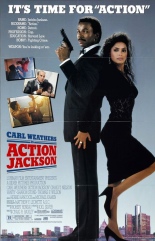
 Why was Action Jackson denied its own franchise? With such macho-flick pedigree — Lethal Weapon’s Joel Silver as producer, stunt man Craig R. Baxley as director and, of course, Apollo Creed himself in the starring role — it looked like Carl Weathers was poised to jump from the Rocky series to his own soon-to-wear-out-its-welcome character.
Why was Action Jackson denied its own franchise? With such macho-flick pedigree — Lethal Weapon’s Joel Silver as producer, stunt man Craig R. Baxley as director and, of course, Apollo Creed himself in the starring role — it looked like Carl Weathers was poised to jump from the Rocky series to his own soon-to-wear-out-its-welcome character.
I blame The Pointer Sisters being on the soundtrack. But I also blame a stupid screenplay and Silver/Baxley for allowing it to dip itself into the pool of ’80s excess.
Weathers is Sgt. Jericho “Action” Jackson. This cat is so cool that the first words we hear out of his mouth are “Mellow out.” Plus, as we learn in the opening minutes, he can run as fast as a speeding taxi. Repeat: as fast as a speeding taxi. Because the boss’ wife has a Parcheesi game, Jackson is asked to attend a Man of the Year dinner for Peter Dellaplane (Poltergeist pops Craig T. Nelson), who happens to be the father of the sexual psychopath who got Jackson demoted, despite his ability to run as fast as a speeding taxi.
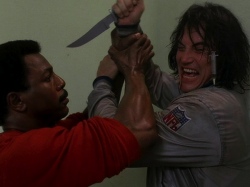 Jackson and Dellaplane naturally exchange words at the frou-frou event, as our Harvard-educated supercop sees right through the sleazy auto magnate’s do-gooder public persona. Sure enough, Dellaplane likes to deal with his competition by truly eliminating them. Catch my drift? (Murder, yo.)
Jackson and Dellaplane naturally exchange words at the frou-frou event, as our Harvard-educated supercop sees right through the sleazy auto magnate’s do-gooder public persona. Sure enough, Dellaplane likes to deal with his competition by truly eliminating them. Catch my drift? (Murder, yo.)
For every kick-ass element to Action Jackson, there’s an equal and opposite reaction. Example: Sharon Stone nude in a steam room; Herbie Hancock’s “wacky” sax licks. Another: Vanity; Vanity. But the worst of all is the dialogue, presumably written as a string of intended catchphrases, particularly in its third act. Following one character busting in on trouble with a hearty “Hello, I’m Mr. Ed! You called about a paint job?,” you get Jackson setting an enemy aflame after cracking, “Barbecue, huh? How do you like your ribs?” Oooooh, burn! —Rod Lott
Celluloid Bloodbath: More Prevues from Hell (2012)
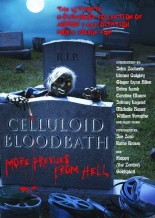
 From 1987, Mad Ron’s Prevues from Hell was one of those dime-a-dozen trailer collections from the VHS heyday I never expected to hit DVD, but in 2010, it finally did, and evidently was successful enough to merit a sequel in Celluloid Bloodbath: More Prevues from Hell. Once again, it’s hosted in part by Happy Goldsplatt, a Cryptkeeper-esque puppet who notes that, in the grindhouse age, the trailers often were more entertaining than the flicks they promoted.
From 1987, Mad Ron’s Prevues from Hell was one of those dime-a-dozen trailer collections from the VHS heyday I never expected to hit DVD, but in 2010, it finally did, and evidently was successful enough to merit a sequel in Celluloid Bloodbath: More Prevues from Hell. Once again, it’s hosted in part by Happy Goldsplatt, a Cryptkeeper-esque puppet who notes that, in the grindhouse age, the trailers often were more entertaining than the flicks they promoted.
Celluloid Bloodbath offers 62 examples, broken up into themed groups that range from your obvious vampires, psychos and cannibals to more clever categories like carnival horrors, promotional gimmicks and killer animals. Italian maestro Dario Argento gets his own short showcase to close out the collection.
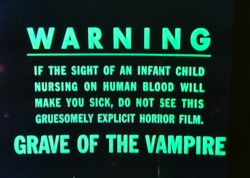 Among the madness are the “weird, winged wonders” and “hideous, horned horrors” of the Philippines-lensed The Twilight People, the pantyhosed thrill-killers of Meat Cleaver Massacre, and the misbegotten Monster a-Go Go “with a genuine, 10-foot-tall monster to give you the whim-whams.” Sales lines like that often prove the highlights; the circus-set Berserk! offers a yes-or-no quiz to potential viewers, i.e. “I get stabbing pains when I see a victim fall on naked bayonets!”
Among the madness are the “weird, winged wonders” and “hideous, horned horrors” of the Philippines-lensed The Twilight People, the pantyhosed thrill-killers of Meat Cleaver Massacre, and the misbegotten Monster a-Go Go “with a genuine, 10-foot-tall monster to give you the whim-whams.” Sales lines like that often prove the highlights; the circus-set Berserk! offers a yes-or-no quiz to potential viewers, i.e. “I get stabbing pains when I see a victim fall on naked bayonets!”
While not as deep-digging as Synapse’s 42nd Street Forever series, Celluloid Bloodbath does sport a couple of real obscurities in its lineup, including Alabama’s Ghost. Yet what infuriates is that, unlike the original, “interview” segments break the flow after every pair or so. Some are relevant, such as Linnea Quigley introducing her film debut in Psycho from Texas (“Now, bitch, let’s dance!”), but most have nothing to do with anything, are shot at some dreary convention, and feature non-names who have nothing of value to contribute. —Rod Lott

